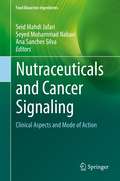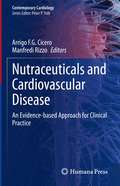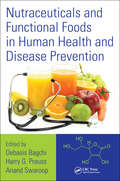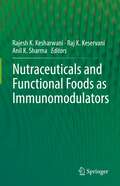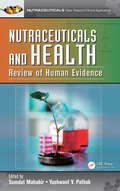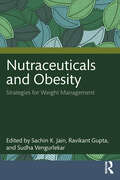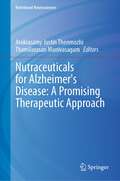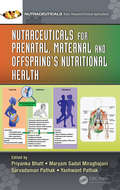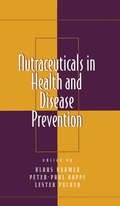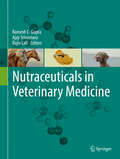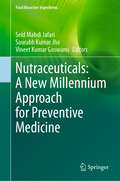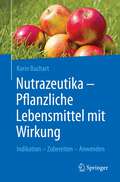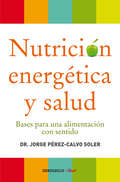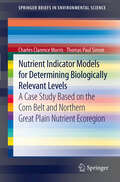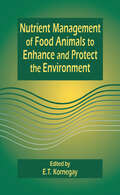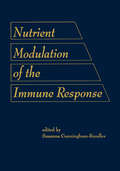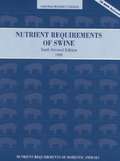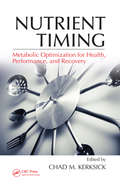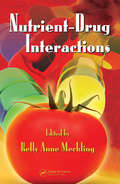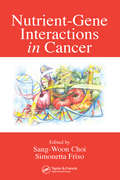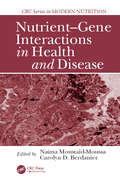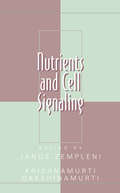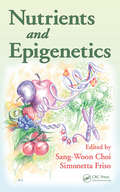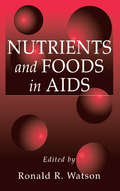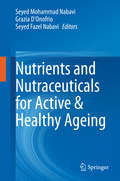- Table View
- List View
Nutraceuticals and Cancer Signaling: Clinical Aspects and Mode of Action (Food Bioactive Ingredients)
by Seyed Mohammad Nabavi Seid Mahdi Jafari Ana Sanches SilvaToday's consumers are looking for food products with health-promoting roles in addition to nutritional benefits. With current research showing that nutraceuticals and functional foods rich in specific bioactives may have chemopreventative effects, these products are increasingly popular. However, while much in the literature supports the health-promoting features of these foods, few texts focus on their bioactive agents and their mode of action in cancer signaling. Nutraceuticals and Cancer Signalling: Clinical Aspects and Mode of Action explains the link between nutraceuticals and cancer in terms of clinical trials and modes of action. This book gives an overview of common cancers and their mechanisms, and the most common functional foods and their bioactive components. Individual chapters focus on specific functional foods--including tomatoes, garlic, honey, tea, yoghurt, and many more--their prominent bioactive compounds, and their mode of action in cancer signaling and chemoprevention. Recent findings on cancer-prevention roles of different vitamins and minerals are also discussed. For food scientists, nutritionists, and pharmaceutical experts looking to understand how functional foods can play a role in fighting cancer, this text serves as a one-stop reference.
Nutraceuticals and Cardiovascular Disease: An Evidence-based Approach for Clinical Practice (Contemporary Cardiology)
by Arrigo F. G. Cicero Manfredi RizzoThis book provides an evidence-based approach for the clinical use of nutraceuticals in the prevention and management of cardiovascular disease. It examines cardiovascular disease epidemiology, risk factors, and the role of dietary patterns. Clinical chapters discuss the use of nutraceuticals in the management of medical conditions such as dyslipidemia, hypertension, insulin resistance, and heart failure. Each chapter contains a short epidemiological background; a list of relevant active compounds and their efficacy, tolerability, and safety; and suggestions for prescribers. This book is a practical guide with the best clinical evidence supporting the use of nutraceuticals in cardiology. Nutraceuticals and Cardiovascular Disease: An Evidence-based Approach for Clinical Practice is an essential resource for physicians, residents, fellows, and medical students in cardiology, clinical nutrition, dietetics, and internal medicine.
Nutraceuticals and Functional Foods in Human Health and Disease Prevention
by Harry G. Preuss Debasis Bagchi Anand SwaroopFunctional foods and nutraceuticals, dietary supplements, and natural antioxidants have established their potential roles in the protection of human health against disease. Nutraceuticals and Functional Foods in Human Health and Disease Prevention examines the benefits, efficacy, and success of properly designed nutraceuticals and functional foods
Nutraceuticals and Functional Foods in Immunomodulators
by Anil K. Sharma Raj K. Keservani Rajesh K. KesharwaniThis book provides valuable coverage on various immunomodulatory research associated with nutraceutical studies, from plant to animal and marine sources. The book focuses on the various properties of nutraceutical and functional foods, from dietary fibers to fungus, marine sources, ginseng, and several others. Its content is also dedicated to the nutraceutical potential and applications of these modulators. The first section of this book focuses mainly on the recent developments in nutraceutical and functional food associated with various immunomodulators. The next section covers the micronutrients and macronutrients level in order to share important data and help readers gain a basic understanding of the techno-functional, nutraceutical potential and applications of nutritional treatment under specific disease conditions. A detailed overview providing the structural and functional properties related to immunomodulators will be highly beneficial for academics and advanced-level students in immunology, food science, clinical medicine, and life sciences.
Nutraceuticals and Health: Review of Human Evidence (Nutraceuticals)
by Yashwant V. Pathak Somdat MahabirAlthough health claims for nutraceuticals range from the fantastic to the sublime, most of these claims are based on cell culture studies and have not been validated in humans, making them inadequate for public health recommendations. Focusing on human population-based research (epidemiology studies), Nutraceuticals and Health: Review of Human Evid
Nutraceuticals and Obesity: Strategies for Weight Management
by Ravikant Gupta Sudha Vengurlekar Sachin K. JainThis comprehensive volume explores the role that nutraceuticals can play in addressing obesity, shedding light on their potential as tools to promote sustainable weight management strategies as well as addressing associated health risks.Delving into the intricate interplay between nutrition, health, and obesity, the book provides a compelling account that illustrates how nutraceutical interventions can be incorporated into holistic obesity management strategies. It begins with an account of the mechanisms by which nutraceuticals function before featuring chapters on their efficacy and safety, how they can be integrated with other therapeutic interventions, and how they can be tailored for individuals with comorbidities. Offering a global perspective on the issue, there is also coverage of the various regulatory contexts in which nutraceuticals are sold and used.Insightful and practical, the book will interest both practitioners and students across allied health, pharmacy, and clinical medicine.
Nutraceuticals for Alzheimer's Disease: A Promising Therapeutic Approach (Nutritional Neurosciences)
by Arokiasamy Justin Thenmozhi Thamilarasan ManivasagamThis book reviews the potential effect of diet modification, lipids, and carbohydrate consumptions, vitamin supplementation, antioxidants, and nutraceuticals in the prevention and management of Alzheimer's disease. The initial chapter of the book presents the pathophysiological mechanisms, risk factors, genetic predisposition, disease diagnosis, pathology, and current treatment strategies against Alzheimer's disease. It also highlights recent developments in exploring novel compounds for the prevention and treatment of Alzheimer's disease. Subsequently, it highlights the therapeutic effect and regulation of molecular targets by natural compounds. The book discusses the potential of natural compounds in inhibiting the formation and deposition of Aβ peptides. It examines the natural compounds in modulating intracellular signaling molecules and enzymes involved in the pathogenesis of Alzheimer's disease. In summary, this book helps understand the role of natural compounds as a therapeutic approach in amelioration and preventing detrimental effects of Alzheimer's disease.
Nutraceuticals for Prenatal, Maternal, and Offspring’s Nutritional Health (Nutraceuticals)
by Yashwant Pathak Sarvadaman Pathak Priyanka Bhatt Maryam Sadat MiraghajaniAlthough there is an increasing number of pregnant individuals taking nutraceuticals to maintain good health, many gaps exist in the knowledge base. These nutraceuticals might be involved in a wide variety of biological processes, and the biological and epidemiological findings of relevant studies should be examined and analyzed. Nutraceuticals for Prenatal, Maternal and Offspring’s Nutritional Health focuses on the role of nutraceuticals for prenatal, mothers, and offspring’s health. In recent years, new trends have been established in this area of prenatal nutrition, that is, mother and offspring health based on appropriate nutrition during pre-pregnancy, pregnancy, and after pregnancy. Nutraceuticals and natural products have been used by many cultures and societies around the world. This book focuses on recent trends and potential clinical evaluations of such nutraceuticals and natural products. Features: Examines the role of Nutraceuticals on the mothers and offspring’s disease and health Focuses on human population-based research Discuses role of nutraceuticals in placental development, nutraceuticals for gestational weight pain and post-partum obesity Covers nutraceuticals impacting uterine growth, gestational age, and mortality rate Explores the question whether Nutraceuticals intake in pregnant women is safe as they might be involved a wide variety of biological processes With 19 chapters written by established lead authors in this field, Nutraceuticals for Prenatal, Maternal and Offspring’s Nutritional Health addresses important findings of the latest scientific research regarding the role of nutraceuticals intake before and during pregnancy.
Nutraceuticals in Health and Disease Prevention
by Lester Packer Klaus KrÄmer Peter-Paul HoppePromoting scientific support for the plethora of health benefits related to nutrition and medicine, Nutraceuticals in Health and Disease Prevention delivers a comprehensive and scientifically sound overview of the latest research findings in disease prevention, therapy, and enhanced body function in the revolutionary field of nutraceutical technolo
Nutraceuticals in Veterinary Medicine
by Ramesh C. Gupta Ajay Srivastava Rajiv LallThis unique work compiles the latest knowledge around veterinary nutraceuticals, commonly referred to as dietary supplements, from ingredients to final products in a single source. More than sixty chapters organized in seven sections collate all related aspects of nutraceutical research in animal health and disease, among them many novel topics: common nutraceutical ingredients (Section-I), prebiotics, probiotics, synbiotics, enzymes and antibacterial alternatives (Section-II), applications of nutraceuticals in prevention and treatment of various diseases such as arthritis, periodontitis, diabetes, cognitive dysfunctions, mastitis, wounds, immune disorders, and cancer (Section-III), utilization of nutraceuticals in specific animal species (Section-IV), safety and toxicity evaluation of nutraceuticals and functional foods (Section-V), recent trends in nutraceutical research and product development (Section-VI), as well as regulatory aspects for nutraceuticals (Section-VII). The future of nutraceuticals and functional foods in veterinary medicine seems bright, as novel nutraceuticals will emerge and new uses of old agents will be discovered. International contributors to this book cover a variety of specialties in veterinary medicine, pharmacology, pharmacognosy, toxicology, chemistry, medicinal chemistry, biochemistry, physiology, nutrition, drug development, regulatory frameworks, and the nutraceutical industry. This is a highly informative and carefully presented book, providing scientific insight for academia, veterinarians, governmental and regulatory agencies with an interest in animal nutrition, complementary veterinary medicine, nutraceutical product development and research.
Nutraceuticals: A New Millennium Approach for Preventive Medicine (Food Bioactive Ingredients)
by Seid Mahdi Jafari Saurabh Kumar Jha Vineet Kumar GoswamiNutraceuticals are defined as any food bioactive compounds or supplements which provide health and medicinal benefits, usually in the prevention of disease and sometimes playing a role in their treatment as well. Nutraceuticals are a combination of a variety of nutrients ranging from vitamins and minerals to certain amino acids. Nutrients are an essential part of the diet and serve a variety of roles in human physiology through various enzymes which govern biocatalysis in various metabolic pathways including tissue and DNA repair and body defense and immunity. Nutrients that are routinely prescribed as dietary supplements include multivitamins, minerals and certain specific amino acids. Nutraceuticals not only serve a pivotal role in tissue repair and body defense mechanism but also play a crucial role in various signal transduction and metabolic pathways. The deficiency of any crucial nutrient can negatively affect metabolic and transduction pathways which can lead toa variety of diseases and disorders. The preventive use of nutraceuticals is a promising new trend for a variety of diseases and disorders. Nutraceuticals: A New Millennium Approach for Preventive Medicine focuses on the preventive use of nutraceuticals to avoid various diseases and disorders. The chapters cover nutrients and human physiology, metabolism and xenobiotics, plus their use in the prevention and treatment of a wide range of diseases and disorders from cancer to cardiovascular disorders to diabetes and renal diseases. Further chapters study the role nutraceuticals play in the treatment of depression and mental illnesses, neurogenerative diseases and autoimmune diseases. The relationship between nutrients and suboptimal health is explored as are links between nutrition and infertility. As these food supplements continue to gain in popularity with consumers, it is increasingly important to understand their benefits and limitations in the prevention and treatment of various diseases and disorders, and this book offers a fully up-to-date snapshot for researchers.
Nutrazeutika - Pflanzliche Lebensmittel mit Wirkung: Indikation – Zubereiten – Anwenden
by Karin BuchartNutrazeutika sind Hausmittel, die eigenständig aus Lebensmittel zubereitet werden und aufgrund ihrer Inhaltsstoffe eine wissenschaftlich nachgewiesene physiologische Wirkung auf die Gesundheit haben. Das Buch geht dem Phänomen ihrer Wirkung auf den Grund und beschreibt Anwendungs- und Zubereitungsmöglichkeiten dieser besonderen Lebensmitteln. Im allgemeinen Grundlagenteil wird das Wesen und der Nutzen von Nutrazeutika erklärt und es werden die unterschiedlichen Verarbeitungsmethoden vorgestellt. Im größten Abschnitt des Buches beschreibt die Autorin die einzelnen Lebensmittel und erklärt deren Wirkung und Wirkmechanismus. Beispiele dieser Lebensmittel sind alltägliche Kräuter, Gewürze, Obst und Gemüse, wie sie in jedem Haushalt eingesetzt werden, z.B. Kamille und Anis sowie Äpfel und Zwiebel. Die abschließenden Kapitel thematisieren die Anwendung in der Gesundheitsförderung sowie in der Therapie bei verschiedenen häufigen Indikationen.Das Buch richtet sich an alle Personen, die in der Gesundheitsberatung tätig sind, wie etwa Diätologen, Ernährungswissenschafter, Ernährungsmediziner sowie an alle an dem Thema Interessierten.
Nutrición energética y salud
by Dr Jorge Pérez-CalvoUn recetario y un gran número de consejos prácticos para el uso adecuado de los distintos alimentos completan este manual práctico de nutrición. Esta obra, fruto de veintitrés años de experiencia en terapias basadas en la dieta, sienta las bases para una alimentación con sentido: explica los efectos de los alimentos en el cuerpo, el psiquismo y el sistema energético corporal; la aplicación de sus propiedades energéticas a las características personales para conseguir mejores resultados; la energética de la digestión y cómo mejorarla; cómo asegurar la ingesta adecuada de los nutrientes básicos, y la aplicación terapéutica de la dieta a distintos trastornos, como el insomnio, la ansiedad, la obesidad o la hepatitis.
Nutrient Indicator Models for Determining Biologically Relevant Levels
by Charles Clarence Morris Thomas Paul SimonNutrient Indicator Models for Determining Biologically Relevant Levels: A case study based on the Corn Belt and Northern Great Plain Nutrient Ecoregion is the first book to provide answers to the management of nutrients based on changes in biological communities. The text describes a case study that is the result of a large scale project in the Corn Belt and Great Plains Nutrient Ecoregion. This study is the first to identify relationships between fish assemblages and nutrient concentrations by Nitrogen species. Species optima based on sensitivity and tolerance to nutrients is modeled. Nutrient Biotic indices calibrated for application are based on the results of years of biological indicator development. Test response intervals and Shift response intervals are formulated and validated against relevant biological assemblage shifts. This case study is the first to suggest recommended values for the nitrogen and phosphorus cycle with identifiable shifts caused in biological assemblages. This will provide watershed and environmental managers with the information needed to manage the inputs into the world's dead zones.
Nutrient Management of Food Animals to Enhance and Protect the Environment
by E.T. KornegayNutrient management is an important aspect of feeding livestock and poultry. Today, there is more attention directed toward this issue in animal production than ever before. The heightened awareness of the environmental impacts associated with animal production has caused animal nutritionists to refocus their thoughts, practices, and expectations regarding how nutrients are supplied to animals. In addition, the increase in the size and intensity of modern production units demands new technologies for enhancing nutrient utilization and for reducing the amount of nutrients excreted. Covering these issues and more, Nutrient Management of Food Animals to Enhance and Protect the Environment is a reference tool for agricultural industry leaders, private practitioners, governmental agencies, and researchers.
Nutrient Modulation of the Immune Response
by Susanna Cunningham-RundThis book demonstrates that nutrients play a direct role as co-factors and regulators of the immune system. The book also shows that modulating the immune response with nutrients can provide a fundamental approach to preventive medicine.;Containing nearly 2300 bibliographic citations as well as illustrative figures, tables, and micrographs, this book is designed to be of interest to clinical immunologists, immunology and vitamin researchers, nutrition specialists, paediatricians, neonatologists, and upper-level undergraduate, graduate, and medical school students in these disciplines.
Nutrient Requirements of Swine: Tenth Revised Edition, 1998
by Subcommittee on Swine NutritionThe tenth edition of this essential reference presents new knowledge about the nutritional needs of swine that consider such factors as growth rate, carcass leanness, gender, health, environment, and repartitioning agents. New sections are presented on requirements for amino acids and other nutrients. In addition, an original modeling approach to arriving at energy and amino acid needs for given animals is incorporated in this revision. The book comes with a CD-ROM that allows users to create tables of nutrient requirements for swine of a specific body weight and level of productivity. Nutrient Requirements of Swine covers: Biological concepts that underlie nutrient needs for growth and function. New data on amino acid and energy requirements and the factors that shape them. New findings on lysine and the bioavailability of amino acids. New research results on minerals and vitamins. Nutrient composition of an expanded list of feedstuffs. The role of water in swine physiology, including factors that affect the quality of drinking water. Expanded tables of feed ingredients and their nutrient composition provide bioavailability estimates, fatty acid composition of fats typically used in swine diets, and important information on estimating the amino acid content of crude protein.
Nutrient Timing: Metabolic Optimization for Health, Performance, and Recovery
by Chad M. KerksickSports nutrition has evolved beyond what to eat and how much to eat to now include the question of when to eat. A hot topic in sports nutrition, nutrient timing is a dietary concept that takes into account time as a missing dimension in athletic performance and recovery. Not only is the consumption of nutrients in ideal amounts and proportions impo
Nutrient-Drug Interactions
by Kelly Anne MecklingCurrent research has given us a more complete understanding of how the chemicals in foods and herbs interact with natural and synthetic drugs. In some cases a single food or supplement can profoundly increase or decrease the toxicity and/or efficacy of a single drug. Although it is standard practice to examine the effects of food consumption on the
Nutrient-Gene Interactions in Cancer
by Sang-Woon Choi Simonetta FrisoThe complete mapping of the human genome, along with the development of sophisticated molecular technologies, has accelerated research on the relationship between nutrients and genes. This has led to compelling evidence garnered from epidemiological and experimental observations supporting the idea that the interaction between nutrients and genes i
Nutrient-Gene Interactions in Health and Disease
by Carolyn D. Berdanier Naima Moustaid-MoussaWe have come to realize that optimal nutrient intake is determined by very specific genetic messages. This realization has led to an entirely new approach to understanding nutrition - the exploration of nutrient effects on gene expression. Edited by leading experts in the field, Nutrient-Gene Interactions in Health and Disease provides an
Nutrients and Cell Signaling
by Janos ZempleniCell signaling is at the core of most biological processes from the simplest to the most complex. In addition to unicellular organisms possessing the essential ability to receive inputs with regard to nutrient availability and noxious stimuli, the cells in multicellular organisms require signaling from adjacent, as well as distant cells to maintain
Nutrients and Epigenetics
by Sang-Woon Choi Simonetta FrisoExplores the Newly Discovered Link Between Nutrition and EpigeneticsCurrent research suggests that nutrients are more than just food components and that certain nutrients can impact the expression of genes that lead to the development of chronic diseases. With contributions from experts in both fields, Nutrients and Epigenetics examines the epigene
Nutrients and Foods in Aids (Modern Nutrition #17)
by Ronald R. WatsonLack of proper nutrition can severely impact the immune system, especially when it is already compromised. This book defines recent advances in understanding the nutritional deficiencies found in AIDS and HIV-positive patients. It explores the scientific knowledge of how nutritional and dietary changes and herbal medicines can benefit or potentially harm these patients. The text also discusses the negative effects of undernutrition that can lead to starvation, a potent immunosuppressant. Nutrients and Foods in AIDS is a much-needed scientific appraisal of current alternative strategies used in preventing or treating AIDS and its symptoms for improved quality of life.
Nutrients and Nutraceuticals for Active & Healthy Ageing
by Seyed Mohammad Nabavi Grazia D’Onofrio Seyed Fazel NabaviThis book focuses on the nutrients and nutraceuticals that promote active and healthy ageing – recently defined by the WHO as the process of development and maintenance of functional capacity that allows well-being at an advanced stage of life. There has been a rapid rise in the use of nutritional interventions as well as specific nutraceuticals in the management of multifactorial aspects of clinical health outcomes. Written by leading experts this book comprehensively discusses the various ageing phenotypes and age-related diseases. It also assesses the nutritional status of the elderly and the various epidemiological factors that influence it. It reviews the role of dietary fiber in disease-free and fully functional ageing. Further, the book explores the benefits of polyphenols, which are secondary plant metabolites, in protecting against cancer, cardiovascular diseases, and various neurodegenerative diseases.
